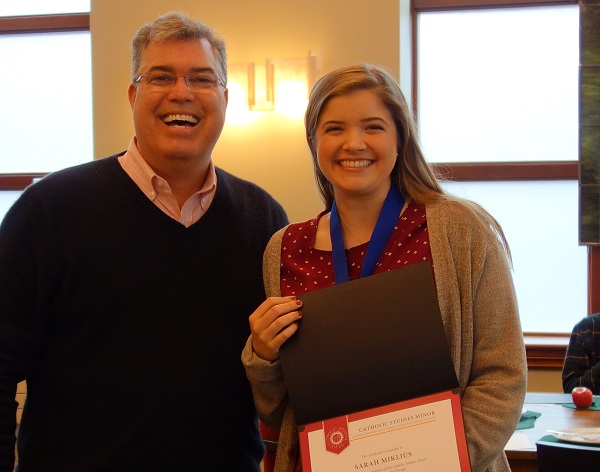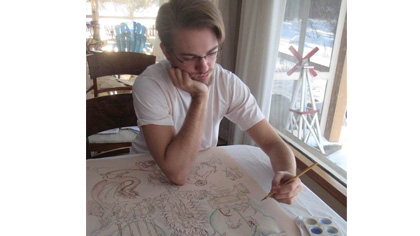Major Minor of The Month
Reflections from a Graduating Minor | Sarah Miklius '19

On May 1, 2019, graduating senior Catholic Studies minor Sarah Miklius gave the following reflection:
Good evening and welcome Catholic Studies minors, graduating seniors, friends, and staff to the 12th annual Catholic Studies banquet. My name is Sarah Miklius for those of you who I have not had the pleasure of meeting before, and I am a senior graduating with a Theology major and minors in Peace Studies and Catholic Studies. As this current chapter of my undergraduate life at Loyola is coming to a close, I have found myself reflecting on the past four years, considering where we’ve been and where we are at right now. As young Catholics living and studying in the US, it is particularly fascinating to look back on our church these past four years.
On May 24, 2015, probably when many of the seniors in the room were heading off to prom and preparing to graduate high school, Pope Francis released his groundbreaking encyclical on the environment, Laudato Sí. Francis called for us to care for our common home, to hear the cry of the earth and its most vulnerable members, and to reject a “throwaway culture” which views God’s creation as disposable. It was also in 2015 that the Pew Research Center found that the total number of Catholics in the United States dropped by 3 million since 2007, and that for every one Catholic convert, more than six Catholics leave the church. 2016 brought about a divisive political culture in the US. It was in this election cycle that many of us could vote for the first time. We anxiously watched as Donald Trump was elected president, receiving 52% of Catholic votes. However, it was also in this same year that Mother Teresa was officially canonized and that Pope Francis invited Syrian refugees to live at the Vatican.
In 2017 we found out that the three countries with the highest numbers of Catholics are now Brazil, Mexico, and the Philippines, notably knocking the US and Poland from the top 3 list. To put this point differently, slightly more than two-thirds of the Catholics in the world once lived in the West. Today, more than two-thirds live outside the West in developing nations, and that share is growing rapidly. The face of the Catholic church started to majorly shift. 2018 of course brought its own immense challenges, as we woke up the morning of August 14 and read the Pennsylvania Grand Jury report, which detailed over 300 cases of sexual abuse and its cover-up at the hands of Catholic Bishops and priests in the state of Pennsylvania alone. For most of the students in this room, this was our “2002 Boston Globe report” moment. This was one of the most startling, horrifying, heartbreaking, faith-shaking moments for us as young Catholics. What was this church we were a part of? Can we count on this institution? Do we want to be part of this?
This year, in 2019, we have decided in one way or another, that we do belong in this Church. That this church is ours. That we are not just “young people in the church” – we are the church. We have disrupted agendas, questioned authority and tradition, reflected, discerned, taken up fasts, and prayed fervently for this institution that we still believe in. Nelson Mandela, when asked about his tireless work fighting against the apartheid in South Africa, once said, “I am a prisoner of hope.” I think that every young person who decides to join or stay in the Catholic Church is a prisoner of hope. Sure, we have been wronged, forgotten, underestimated, and belittled. We have been given acoustic guitars and cool youth ministers in place of justice and reform. And still, we rise. We show up to Thursday night mass in Ignatius house, and cry to the praise and worship music afterward, because we know that we are God’s beloved children, and we feel it. We fight to have 24 –hour adoration on campus because we feel so drawn to Jesus in the blessed sacrament. We travel to the margins on alternative break immersion trips and with Labre homeless ministry because we know that we can meet Jesus there, too. We are claiming our space in this church, and we are proud to do so.
Tonight, we are blessed with the opportunity to do what is perhaps the most Catholic thing we could do: to sit and share a meal with friends. I look around this room, and I see the present and future of the Catholic Church right here. And I have to say, looking at your faces, I don’t feel so much like a prisoner anymore – I think I’ll willingly and happily choose to have hope. Thank you.
-

Profile
Major Minor of the Month: Laura Bottei
Meet Laura Bottei, Catholic Studies' Major Minor of the Month! -

Profile
Major Minor of the Month - Lisette Amon
Meet Lissette Amón, Catholic Studies' Major Minor of the Month! -

Profile
Major Minor of the Month: Amanda Timlin
Meet Amanda Timlin, Catholic Studies' Major Minor of the Month! -

Profile
Major Minor of the Month - Justyna Skowronski
Justyna Skowronski is an English and Journalism major. -

-

-
-

-

-

-
-

-

-

-

-

-

-

-

-

-

-

-

-

-

-

-

-

-

-

-

-

Profile
Major Minor of the Month- January 2014
Learn about this student in our Catholic Studies Program! -

Profile
Major Minor of the Month - December 2013
Learn about this student in our Catholic Studies Program! -

Profile
Major Minor of the Month - February 2014
Learn about this student in our Catholic Studies Program!



